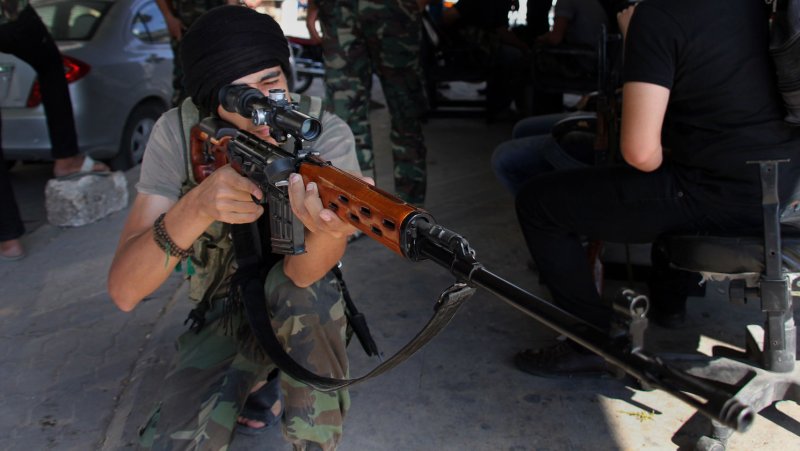Syrian rebel fighter surveys the situation in Aleppo, Syria, September 12, 2012. Syrian rebels have vowed to retake control of the large Hanano army base in Aleppo, a few days after losing control of it to Syrian government forces. UPI/Ahmad Deeb |
License Photo
WASHINGTON, Feb. 27 (UPI) -- The Obama administration is working with European allies on possibly giving non-lethal equipment to Syrian rebel fighters, U.S. and European officials said.
Providing military equipment such as body armor and armored vehicles, and possibly providing military training, would be the first direct aid to the opposition Free Syrian Army in the 2-year-old conflict that has claimed about 70,000 lives.
The administration was also considering sending humanitarian assistance directly to Syria's opposition political coalition, said The Washington Post, which first reported the move toward a major policy shift.
Elements of the proposed shift, which have not been finalized, are being discussed by Secretary of State John Kerry with allies in Europe and the Middle East during meetings this week and next, the Post said.
Kerry is conducting a nine-nation tour in his first official trip abroad as the top U.S. diplomat.
Those diplomatic meetings included a nearly 2-hour meeting in Berlin Tuesday with Russian Foreign Minister Sergei Lavrov and a planned 11-nation conference in Rome Thursday with allies and leaders of the Syrian Opposition Coalition, the Post said.
Lavrov told Russian reporters Tuesday his talks with Kerry were "quite constructive."
Syrian opposition coalition political leaders threatened Saturday to boycott the Friends of the Syrian People meeting in Rome but changed their mind Monday after Kerry and British Foreign Secretary William Hague convinced them in phone calls significant proposals would be on the table, coalition President Moaz al-Khatib said.
U.S. Vice President Joe Biden also called Khatib to support the case, the Post said.
Khatib wrote on the coalition's Facebook page Monday his group would attend because Kerry and Hague "promised specific aid to alleviate the suffering of our people."
In a phone call with Khatib afterward, Biden commended the decision, spoke of "ways to speed assistance to the opposition and support to the Syrian people" and affirmed the Obama administration's "commitment to a political transition in Syria to a democratic and inclusive post-Bashar Assad government," the White House said Monday night.
Syria's foreign minister in Moscow Monday said he was willing to meet with the opposition leaders.
Kerry made several indirect references to a policy shift during his travels this week, the Post said.
He told German students Tuesday Washington wanted a "peaceful resolution" in Syria, but said if the Syrian regime refuses to negotiate and continues killing citizens, "then you need to at least provide some kind of support" for those fighting for their rights, the Post said.
In London Monday Kerry told reporters: "I want our friends in the Syrian opposition council to know we are not coming to Rome simply to talk. We're coming to Rome to make decisions about next steps and perhaps even other options."
The New York Times reported Feb. 19 Obama was open to reversing himself and deciding to arm vetted Syrian rebel fighters.
Obama rejected a proposal last fall by four top national security officials who wanted to arm the rebels, in favor of continued efforts to build the political opposition.
The security officials proposing the idea were Defense Secretary Leon Panetta, Joint Chiefs of Staff Chairman Martin Dempsey, David Petraeus, the CIA director at the time, and Hillary Clinton, then the secretary of state.
The proposal called for the United States to vet the rebel groups and train fighters supplied with weapons, with the help of a neighboring state.
The risky plan offered the potential reward of creating Syrian allies the United States could work with during the conflict and after Assad's eventual removal, the Times said.
Concerning direct humanitarian aid, the Obama administration has provided $385 million in humanitarian aid to Syria through international institutions and non-governmental organizations that are mostly supervised by the Assad regime.
The White House has cited legal restrictions on directly funding the opposition.
The administration has also provided $25 million in medical supplies and communication equipment to help the anti-Assad fighters and civilian opponents coordinate their activities and report on the fighting to the rest of the world.















